The Wire Talks
The Wire Talks is back, but with a new look. Now, host Sidharth Bhatia will chat with guests on video as well as audio, on issues such as culture, politics, books and much more. Our guests will be well-informed domain experts. The idea is not to get crisp sound bites but to have a real discussion, resulting in an explanation that is insightful and offers the audience much to think about.
Episodes

Friday Aug 08, 2025
Friday Aug 08, 2025
Historian Richard M Eaton says he is “very concerned” at the erasure of the Mughals — “one of the most spectacular empires in the world” — from school history books.
Eaton, one of the most eminent historians of pre-modern Indian history, debunks some myths about the Mughals in this podcast conversation with Sidharth Bhatia.
He pointedly says that though the Mughals were Muslims, “they saw religion as a very personal affair and rarely tried to convert non-Muslims.” According to him, “they saw fooling around with religion as something that would only endanger the stability of the state. Akbar and Aurangzeb were both very explicit about not allowing religion to interfere with state policy.”
It was the British who painted the Mughal rule as a “dark period”, because that way they could “project themselves as bringing peace, stability, efficiency” to the land which had till then experienced incompetent rule.
He talks about how for a long time Aurangzeb was revered and venerated among his subjects, Muslims as well as well as Hindus. “His grave was a pilgrimage site,” he says. All this changed after the five volume biography of Jadunath Sarkar in the early 20th century.
Eaton makes it clear that this villainising Mughals will not change the basic fact that their influence on art, culture, good, language and everything else in India is all pervasive and part of India. “You will never get rid of the Mughals, you will have to live with them.”

Friday Jul 25, 2025
Friday Jul 25, 2025
There is a widespread belief that the 1950s were a time of great Hindi films, in terms of stories, songs and film-making. Seventy-five years later, fans still remember those songs, those stars and, most of all, those directors. We look back and call it the Golden age. What does that mean?
“I think it’s partly because the 1950s are also seen as a kind of Golden Age of India,” according to Rachel Dwyer, a former professor of film at the School of Oriental and African Studies (SOAS) who has written several books and articles on Hindi cinema. “A figure like Nehru at the time was seen as a major world figure. But also something exciting going on in Indian cinema at the time.”
“We saw several great directors working, the rise of major stars, playback singing being normalised and the stories too, which were usually about a hero looking to find a place in this new world, really spoke to people in a very direct way, and not just people in India, of course, but people across the world,” she said in a podcast discussion with Sidharth Bhatia.
Two of the major directors of the period were Guru Dutt and Raj Kapoor. This is the 100th birth anniversary of Guru Dutt and last year was Raj Kapoor’s birth centenary.
Dwyer discusses their work, through their films Pyaasa and Shri 420. “These have a great appeal about a certain innocence, about a freshness, and the way that they just happen to be really good entertaining films.” She also analyses their personas – the Raj Kapoor on-screen persona, the ordinary everyman, and Guru Dutt the poet.
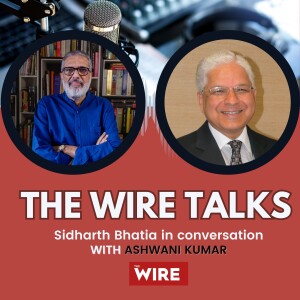
Friday Jul 11, 2025
Friday Jul 11, 2025
The Election Commission’s announcement in Bihar that a citizen should prove his or her credentials to vote has sparked outrage among political parties. They say that a large number of marginalised communities will lose their right to vote.
“It is indeed very problematic. To shift the onus of establishing identity or citizenship on the voter is fraught on principle in a democratic country,” says Ashwani Kumar, senior advocate and a former minister for law and justice and also former Additional Solicitor General.
“What was the justification of excluding Aadhaar or ration cards from the process,” Kumar said in a podcast discussion with Sidharth Bhatia. He said that there is an element of distrust which has cropped up in the last couple of years. “So Election Commission now has the duty to dispel to the satisfaction of all concerned that its circular or its Special Intensive Revision (SIR) will not be exclusionary.”
He also spoke about declining standards of Indian democracy. “Political opposition in a democracy cannot be treated as personal enemies,” he said. “All parties, without exception, are being seduced by the temptation of using the harshest possible language against political opponents. That is what we have come to.”

Friday Jul 04, 2025
Friday Jul 04, 2025
The Devendra Fadnavis government has withdrawn its proposal to introduce Hindi in the early classes in schools in Maharashtra because of the opposition’s pressure. In Tamil Nadu too, there has been pushback on the introduction of Hindi by the Modi government.
“In Maharashtra the BJP cannot afford to take electoral risks,” says Professor Alok Rai, academic and author who has taught in universities in India and in the US and has written a book called Hindi Nationalism.
But, he points out, the BJP does not want just to introduce the language. “It has a larger cultural agenda behind it. Hindi carries within it a coded language,” he tells Sidharth Bhatia in this podcast. “The agenda is a Hindu agenda, an upper caste agenda.” The introduction of Hindi in the south “consolidates their support in the Hindi belt.”
Also, “School Hindi is very different from what is spoken on the streets,” he says. Everyday Hindi, that is Hindustani, "has evolved". “School Hindi is sterile”, he says.
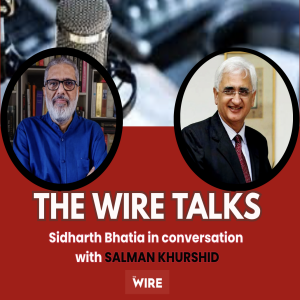
Thursday Jun 26, 2025
Thursday Jun 26, 2025
India’s stand on global events is becoming increasingly unclear. Whether on the Israel Iran war or the Ukraine-Russia war, India has not taken a clear position, though in recent years, India has been supportive of Israel, giving up the country’s long standing support of Palestine.
Nor has prime minister Modi clearly repudiated President Trump’s repeated statements that it was he who brought an end to the India-Pakistan conflict.
Does India have a voice in global affairs? Salman Khurshid, a former external affairs minister in the Manmohan Singh government, thinks not. In a podcast discussion with Sidharth Bhatia, Khurshid says. “We are doing too much lecturing and parroting phrases and not enough diplomacy.”
“India requires to get up and be able to say something and do something that will make a difference. We could and should have a role” in world affairs. But we are simply “making phone calls”.
Khurshid, who also was in a multi-party delegation that travelled to south-east Asia and the Far East, said that the outcome of the trip was “satisfactory” but “we could not get any commitments”. The discussion covers a wide range of topics, including India’s relations with its neighbours, India’s stance on Israel and its bombing of Gaza and the lack of clear information by the Modi government.

Thursday Jun 26, 2025
Thursday Jun 26, 2025
India sends students to the US in record numbers, but this academic year, applicants are feeling anxious before they head out. The changing policies of the Trump administration is likely to cause delays and tougher immigration questioning, among other things. Moreover, it is likely that the Optional Practical Training (OPT) programme, which allows F-1 visa holding students to work for a year or more, will be modified if not terminated. That was one of the great attractions for foreign students in the US. So is it still worth going to the US to study? “Absolutely,” says Viral Doshi, who has advised Indian students heading to the US for the last 20 years. “No other country can match up to the US,” he says, in sheer number of colleges, in the kinds of courses it offers and in the experiences one can have.
He acknowledges that parents have anxieties but “I tell them, have patience,” he says in a podcast discussion with Sidharth Bhatia. “Almost 50 percent students have already got visas and others will too, maybe a few weeks late for the first semester.” He says universities depend foreign students and are saying they will allow students to come late.”
“America is not the same as it was some years ago. Things have changed. No more internships and no more jobs or work experience.” And most important, he adds, “Avoid political activism.”
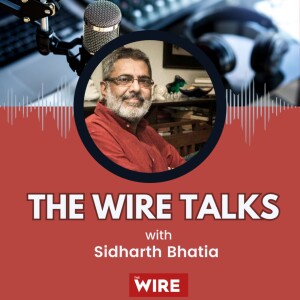
Thursday Jun 26, 2025
Thursday Jun 26, 2025
Every year, parts of Mumbai’s streets and tracks get flooded after the rains, but this year, the floods happened in the southern parts of the city. South Mumbai is generally considered immune to this kind of monsoon flooding, but this year, things were different. Citizens of Mumbai have got used to such inconveniences during the rainy season, especially in the first few days and weeks, but things are getting worse year after year. “Poor planning is part of it,” says Hussain Indorewala, teacher and urban researcher, in a podcast discussion with Sidharth Bhatia. “Planning in Mumbai has come to mean real estate schemes”, he said. “ Apart from real estate development, there is very little thinking on transport, sewage, water supply etc.” he says. He says this kind of flooding will probably happen every year. The digging for construction activity is one reason, and the open space around the new construction is reducing, could be another. The Coastal Road too has shut down many water channels. Mumbai needs better governance and one idea suggested is to have a directly elect a mayor and representatives. “Decision making now is done by bureaucrats and the state government.
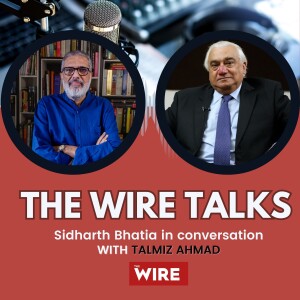
Friday May 23, 2025
Friday May 23, 2025
Veteran Indian diplomat Talmiz Ahmad, who is an authority on the Middle East, says Turkey has been bringing up Kashmir for a long time but relations were slowly warming up.
“But it helped Pakistan during its conflict with India” and that was too much for India, he said in a podcast discussion with Sidharth Bhatia.
“Turkey is on a high and wants to expand its footprint to South Asia,” he said. “Pakistan brings geopolitical value to Turkey and if they get together, they will form a formidable alliance.”
Even so, Ahmad said, he is a strong believer in diplomacy and he felt that India should continue on the diplomatic path. “Its important also to talk to those who disagree with you,” he said.
Discussing India’s growing ties in the Gulf countries, Ahmad, who was Ambassador to UAE, Oman and Saudi Arabia, (twice), said that “our ties go back over a millennia” and “India should be seen to be “as a role player in the security scenario in the region.” “We should be an influencer in the Gulf region.”
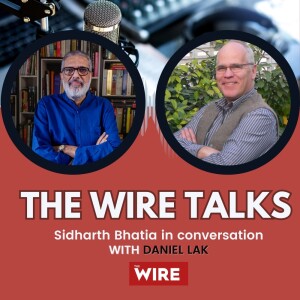
Friday May 09, 2025
Friday May 09, 2025
With the election of a new prime minister in Canada, there are hopes that relations between India and Canada will improve. Under Justin Trudeau, the previous one, ties had plummeted after he made allegations that India had a role in the killing of a Canadian citizen Hardeep Singh Nijjar.
“Trudeau had five Sikhs in his cabinet and was responding to diaspora politics,” says veteran journalist Daniel Lak in a podcast discussion with Sidharth Bhatia. Lak was with Al Jazeera as the US and Canada correspondent and earlier had served in India, Pakistan and Nepal as a BBC correspondent.
He says Sikhs have been coming to Canada for over a century and most of them are here to make a life for themselves rather than get involved in what he calls ‘diaspora politics’. “They are two percent of the Canadian population and have established themselves in several sectors including transportation."
“I get India’s anger,” he says, at the Indian insistence that supporters of Khalistan be restrained.
The new prime minister will also at some stage have to manage this part of the relationship, but “he is a technocrat” and Canada will want to increase trading links across the world, including with countries like India, especially after the US President Donald Trump threatening to make Canada the 51st state.
The discussion includes issues like the loss of NDP leader Jagmeet Singh and immigration and from India.
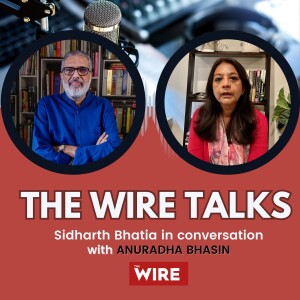
Friday May 02, 2025
Friday May 02, 2025
The killing of 26 tourists in Pahalgam on April 23 came as a ‘shock’, because never before had terrorists targeted tourists, says Anuradha Bhasin, an astute observer of events in the Union Territory.
It's not that terrorism had disappeared after the removal of Article 370 in 2019, as the Modi government constantly claimed, Bhasin said in a podcast discussion with Sidharth Bhatia.
The reaction among ordinary Kashmiris was one of grief, she said. “They came out to help, as they have on every occasion earlier – that is Kashmiriyat.”
But, she said, the constant pushing of the “tourism narrative” to show things were normal was creating “alienation” among the locals. It hid the “ugliness of the Kashmiris being economically disempowered—new land laws, allowing outsiders to bid for contracts” were causing resentment, she said. “There was a complete erasure of what is happening in Kashmiris.”








